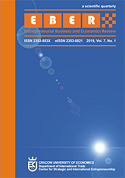Internationalisation Patterns of Polish Family High-Tech Firms
Internationalisation Patterns of Polish Family High-Tech Firms
Author(s): Nelly DaszkiewiczSubject(s): Business Economy / Management, Family and social welfare, Economic development
Published by: Uniwersytet Ekonomiczny w Krakowie
Keywords: internationalisation; family firms; high-tech firms; international entrepreneurship;
Summary/Abstract: Objective: The objective of the article is to explore internationalisation patterns of family high-tech firms, especially their internationalisation motives, intensity, speed, and entry modes. Research Design & Methods: The empirical part adopts a quantitative approach. The results of the survey are presented on the sample of 263 high-tech production firms from Poland, including 101 family firms. The survey was conducted in all 16 Polish regions. The calculations from obtained survey results were made using Statistica PL 10. Findings: The research results show that the intensity of internationalisation of family firms is lower than that of non-family enterprises and that family businesses are less likely to internationalise early than in the case of non-family enterprises. On the other hand, the study found no differences between family and non-family businesses in their entry modes choice and internationalisation motives. Implications & Recommendations: Familiness is one of the key factors that explain the internationalisation of firms. However, various research findings still differ on how international behaviour of family firms may be different than in the case of nonfamily firms. Thus, the impact of familiness on internationalisation patterns requires further, deeper investigations. Contribution & Value Added: The main contribution of this article is that it investigates Polish family firms, which are relatively young in comparison to the Western European ones. Moreover, the Polish firms belong to high-tech industries that often behave differently in the foreign markets than firms from traditional branches. The study indicates that familiness is an important aspect relevant in explaining the internationalisation patterns of firms.
Journal: Entrepreneurial Business and Economics Review
- Issue Year: 7/2019
- Issue No: 4
- Page Range: 147-163
- Page Count: 17
- Language: English

